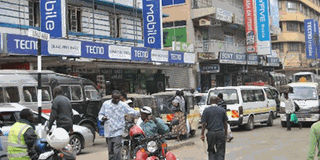Luthuli Avenue grows into an electronics hub

Electronics shop along busy Luthuli Avenue on June 30 2012. Photo/ANTHONY OMUYA
What you need to know:
- From a derelict part of the capital city, the area now boasts new buildings that offer an array of products
Beyond the subtle Moi Avenue and the busy Tom Mboya Street in Nairobi lies a one-lane shopping district that is bustling with life.
Here, at least three matatu stages serving different parts of the city converge, boda boda operators and tuk-tuks jostle for customers, and the latest car models are parked along freshly-painted lanes.
Large and colourful advertising billboards showcasing technology brands dot buildings’ exteriors as hundreds of people walk in and out of the many shops and restaurants.
Amid all the noise and mayhem, the melody of gospel and reggae music finds its way to the eardrum of passers-by. You are on Luthuli Avenue, the newly-crowned technology centre in downtown Nairobi.
Once a derelict business area in the central business district, the street has over the years been transformed into a major shopping zone that has attracted customers and suppliers from across East Africa and beyond.
It has grown to become the capital of electronics, offering an array of goods ranging from television sets, camera accessories, mobile phones, to memory cards and even flash disks.
Shop owners here understand the advantage of diversifying, with high-quality and expensive goods being sold next to low-end, cheap merchandise.
When Ms Jane Njoroge started operating her shop on Luthuli Avenue, little did she know that her business would thrive quickly.
On a cold Wednesday morning, and draped in a woollen scarf, Ms Njoroge said she was happy with the way customers were flocking the area. “They find the prices here to be fair,” she said.
“Customers are able to find a price range that will accommodate their pockets. It is all about them.”
This price is what attracts many of the city’s residents and beyond to Luthuli. Mr Mohamed Abdullahi, who manages two electronics shops here, says that high-end businesses also come to shop for accessories.
“You will see some shops, some as close as Moi Avenue and others in high-end malls, coming to buy stuff from Luthuli,” he said. “Of course, the prices will be radically different, but our goods are from the same place.”
This has seen many business people and investors selling their shops in other areas to set base on Luthuli.
The Chinese factor
One of the most interesting phenomena about Luthuli Avenue is the number of Chinese nationals and investors who have pitched tent there.
This comes as Chinese firms and manufacturers go local in order to penetrate the consumer market in Kenya, with a special emphasis on the low-income segment of the society.
This, experts say, can only benefit the local economy by increasing capacity development and building the competitive market.
“As the population increases, there is demand for wealth creation and employment,” said Ms Carole Kariuki, the chief executive of the Kenya Private Sector Alliance. “So as more Chinese set up base here, we need to harness the opportunity and increase the capacity of our economy for growth.”
However, traders said the arrival of the Chinese has been a bitter-sweet development. It is sweet because they have been able to partner with Chinese financiers, saving them the hustle of travelling to China to import goods.
Mr Abdullahi said his company has partnered with a Chinese investor in the technology industry for close to two decades.
“He can easily distinguish between what is genuine and what is original,” he said. “So, he saves us a lot of trouble going down there. In the end, since he is a shareholder, we divide the profits 50-50.”
Small businesses
Small businesses have also benefited from the booming growth. This has increased the amount of leverage the area wields as the gadget business moves beyond Luthuli Avenue to River Road and Gaberone Road.
Mr Benson Njoroge, who has managed a small M-Pesa shop on Gaberone Road over the past few months, said the fact that Luthuli is a stop for many people who use matatus has aided the growth of his business. “In other sections of town, the shops are closed by 5 or 6 pm,” he said, “but for us, we are open till 8.30pm or even nine.
“In the morning, we open as early as 7am because many people want to buy goods when they get off the bus,” he added.
Boda boda operator John Mwangi said that over the past year, he has seen his profits rise because of the many customers who visit the area.
“This is a hard business to manage, but we are holding up,” he said.
As growth continues in this part of town, landlords have also powered up bulldozers to bring down old buildings, replacing them with modern types with expensive goodwill to boot.
East meets West
One of the distinguishing features of Luthuli Avenue is that it is a technology hub that has become a melting pot for cultures.
Indians, Chinese, Kenyans, and Somalis all trade shoulder to shoulder, making it one of the most successful business stories in Kenya.
This way, Ms Kariuki said, Kenyans are able to interact with business-minded people who have an international outlook.
To maintain this relationship, she said “Kenyans should engage others fairly, diversify products, organise ourselves so that we have one voice, compete fairly and more importantly, abide by the law.”
For traders like Ms Kariuki, Mr Njoroge, and Mr Abdullahi, the rise and rise of Luthuli Avenue is just the beginning of a bright future.




